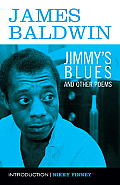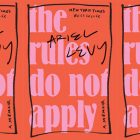Jimmy’s Blues and Other Poems
 Jimmy’s Blues and Other Poems James Baldwin Beacon Press, April 2014 120 pages $16.00 Buy: book | ebook
Jimmy’s Blues and Other Poems James Baldwin Beacon Press, April 2014 120 pages $16.00 Buy: book | ebook
The cover of Jimmy’s Blues and Other Poems features blurbs by none other than Toni Morrison and Maya Angelou, telling the world to read this book. I’ll be honest; I feel like I can’t add much to that—just listen to Morrison and Angelou. But if you need a bit more convincing, here are some remarkable feats that Jimmy’s Blues and Other Poems accomplishes.
Some of Baldwin’s poems are intensely political, and while much political poetry tends to read like an ideological statement veiled as poetry—which I admit I’m not a fan of—in Baldwin’s case he writes poetry first and foremost: lyrical, captivating, evocative, thought-provoking poems that also happen to be exploring the political climate of his time. In “Straggerlee wonders,” for example, the speaker claims that the U.S. government finds “a way around every treaty.”His tone is similarly critical when he writes that “[t]his flag has been planted on the moon:/ it will be interesting to see/ what steps the moon will take to be revenged.” What I found genuinely surprising and wonderful was his focus on creating narratives and characters against the background of political tensions, which make his poems relatable, accessible and not one bit outdated.
What’s perhaps even more outstanding about Jimmy’s Blues and Other Poems is that it’s incredibly enjoyable to read. Baldwin explores themes of love, family, race, oppression, injustice and human nature, and with a wide variety of styles and structures—which makes the book as a whole exciting to read, because you never know what’s coming next. Will it be a multi-page extended poem that is essentially a story, which will have you at the edge of your seat as you wonder what will happen next (“Gypsy”)? Or will it be a brief thought-experiment of under thirty words (“Imagination”)?
Stylistically Baldwin often makes use of short lines and rhyme, which also quickens the pace of the reading experience. (More than once, the meter and rhyme made me think one could dance to this or that poem.) Yet what is jarring and ultimately captivating in these poems is that the content is frequently not pleasant. For example, in “Confession” Baldwin writes “I watch her open the door./ She thinks that she wishes/ to be a whore.” This tension between the blunt, brutal honesty of Baldwin’s subject mattee and their lulling, lyrical presentation makes Jimmy’s Blues and Other Poems a tremendously compelling, engaging book.
In a 1963 speech, Baldwin said, “the poets (by this I mean all artists) are finally the only people who know the truth about us. Soldiers don’t. Statesman don’t. . . . Only poets.” And by that standard, James Baldwin was a poet through and through.



